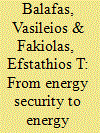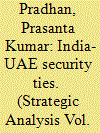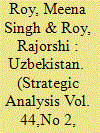| Srl | Item |
| 1 |
ID:
170548


|
|
|
|
|
| Summary/Abstract |
This article begins with a discussion on how the China-Pakistan Economic Corridor (CPEC) is viewed differently by different political parties as well as by the civilian and military establishments in Pakistan. The discussion then turns to Pakistan’s current economic conditions and examines whether CPEC has the potential to boost the Pakistan economy or contribute to the worsening of its economic conditions. This article also discusses how CPEC seeks to maintain a balance between geo-economic and geopolitics. The article throws light on how CPEC has affected the internal political dynamics within Pakistan, and why the work on CPEC has slowed down.
|
|
|
|
|
|
|
|
|
|
|
|
|
|
|
|
| 2 |
ID:
170544


|
|
|
|
|
| Summary/Abstract |
In the aftermath of the successful ‘America First’ or ‘Make America Great Again’ presidential election campaign, President Trump’s era inaugurated the realm of energy politics. It began with the US withdrawal from the Paris Climate Agreement and the lifting of the US export ban on crude oil. So far, it has been featured in setting aside President Obama’s climate change mitigation policy, which emphasized regulation, discouraged oil and gas development, and denounced the extensive exploitation of natural resources. As a whole, the new Trump era favours shale oil and gas drilling, deregulation and the revitalization of the coal industry.This article argues that a switchover of US priorities from energy security to energy dominance is currently in the making. Through the lens of an explanatory framework, the new US political leadership, after a period of economic recession in the wake of the crisis of 2007–2008, has blended economics and politics to improve shale technologies, and take advantage of its rich natural resources, in order to ensure its global superpower role.
|
|
|
|
|
|
|
|
|
|
|
|
|
|
|
|
| 3 |
ID:
170547


|
|
|
|
|
| Summary/Abstract |
Traditionally dominated by the trade, energy and Diaspora ties, the India-UAE relationship has been growing substantially in the security arena in recent years. There are deliberate and robust attempts from both sides to forge strong security cooperation. The high volume of trade and commerce, common threat perceptions such as terrorism and piracy, continuing regional instability in West Asia since 2011 are some of the key drivers of the growing India-UAE security cooperation. Recent high-level visits have provided the much needed confidence to both sides to engage in the security domain. The relationship has strong potential to grow in the future, given the persisting fragile security environment in their neighbourhood.
|
|
|
|
|
|
|
|
|
|
|
|
|
|
|
|
| 4 |
ID:
170545


|
|
|
|
|
| Summary/Abstract |
India has redefined its engagement with Eurasia in the last few years. It has sought to re-energize ties with its extended neighbourhood based on its historical linkages, positive and benign image, and overlapping security and economic interests. In this context, ties with Uzbekistan remain a key pillar of India’s Eurasian calculus. Tashkent’s strategic location at the crossroads of Central Asia and abundant natural resources form the fulcrum around which the security of Central Asia revolves. The country’s ongoing dynamic phase of accommodative regional cooperation has added a new dimension to the Central Asian political landscape. At a time when the entire region is undergoing a significant transition, marked by new strategic equations and alignments between both the regional and extra-regional powers, a new India is seeking to build meaningful cooperation with a new Uzbekistan which is focused on energy, trade, education, connectivity, and security.
|
|
|
|
|
|
|
|
|
|
|
|
|
|
|
|